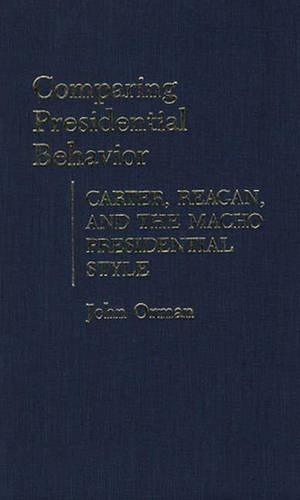
Comparing Presidential Behavior: Carter, Reagan, and the Macho Presidential Style
(Hardback)
Publishing Details
Comparing Presidential Behavior: Carter, Reagan, and the Macho Presidential Style
By (Author) John Orman
Bloomsbury Publishing PLC
Praeger Publishers Inc
15th April 1987
United States
Classifications
Tertiary Education
Non Fiction
Regional, state and other local government
353.031
Physical Properties
Hardback
199
Description
Orman's Comparing Presidential Power is an important and insightful study of the American Presidency. The macho model of presidential leadership is developed well and supported by both primary and secondary research. In fact, a brief overview of the book cannot do justice to the detailed analysis and support provided in the work. The text is well documented and every assumption is illustrated by several specific examples. The humanistic study is written from an audience perspective providing a socio-psychological orientation of how the public interprets the office. Thus, the lasting value of the book is not so much in the comparison of the Carter and Reagan presidencies or the defense of the Carter administration but in the provision of a complete model or theory of the contemporary institutional presidency. The book is a valuable contribution to the literature and thus a must for scholars and students of the American presidency. Presidential Studies Quarterly The president of the United States may be considered the quintessential symbol of the country, and, as such, a reflection of society's dominent values. His actions and decisions are influenced by a number of factors, including the prevailing environment, bureaucratic policies, and the incumbent's personality. Over and above the abilities and opportunities of the person who holds the office, John Orman argues that success of a president's policy endeavors is ultimately dependent in luck and good timing. His hypothesis is that a president's success depends on the ability to align actions with a society that places a premium on machismo. Using this theory, he analyzes the presidencies of Jimmy Carter and Ronald Reagan.
Reviews
Orman argues that the behavior of US presidents can be explained by their efforts to live up to a machismo image. When presidents deviate from the macho myth, in the manner of Jimmy Carter, they jeopardize their political power because society, particularly the press, measures presidential success in stereotypical images. Although Ronald Reagan has reestablished the macho presidential style, Orman warns that the willingness of the macho president to resort to force makes him dangerous in the nuclear world. What is needed is a new androgynous style of presidential leadership that would maximize stereotypical feminine' components and sex-neutral values in concert with the macho political values." The book presents an unusual interpretation of the president's relationship with the public....-Choice
"Orman argues that the behavior of US presidents can be explained by their efforts to live up to a machismo image. When presidents deviate from the macho myth, in the manner of Jimmy Carter, they jeopardize their political power because society, particularly the press, measures presidential success in stereotypical images. Although Ronald Reagan has reestablished the macho presidential style, Orman warns that the willingness of the macho president to resort to force makes him dangerous in the nuclear world. What is needed is a new androgynous style of presidential leadership that would maximize stereotypical feminine' components and sex-neutral values in concert with the macho political values." The book presents an unusual interpretation of the president's relationship with the public...."-Choice
Author Bio
JOHN ORMAN is Associate Professor of Politics at Fairfield University.
